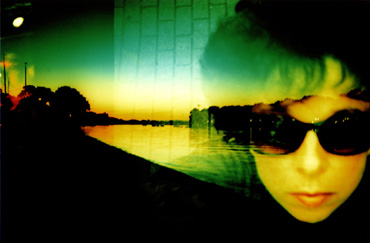The making of an album
Don’t think too much
Malka Spigel emphasises the organic nature of her creative process: “It’s about not thinking or planning or having a concept – not even deciding not to think. You do it before your brain gets involved. It’s quick. It’s instinctive.” Every Day Is Like The First Day was created very much in that spirit. The title itself is a mantra for Spigel, intimately linked to her process, as she comes to each new piece of work as a discrete act of creation, with no preconceptions, no plans: “Every song is like the first song,” she explains. “That’s the way I like to approach music.”
Forget the future
The genesis of this material was an exploratory four-day stint with spouse, collaborator and producer Colin Newman at Press Play Studio in London: “We didn’t talk about what the record or the songs would be,” Spigel recalls, “or what the direction would be. Nothing. There was zero preparation.”
Start from nothing
The studio (run by Stereolab’s Andy Ramsay) offered a treasure trove of musical playthings with which to interact intuitively – from bouzouki and vibraphone to decommissioned Stereolab organs and synths. This was an ideal environment for Spigel’s blank-slate approach, and it influenced the musical direction as it developed between her and Newman: “We started from scratch in the studio, with all these strange instruments,” she says. “The songs were built on random starts, tiny little sequences, just piano lines, or the two of us playing bouzouki and guitar or bass and guitar.”
Don’t look back
Having laid the foundations, the couple embarked on a second phase, opening the work up to collaboration: “We erased the history of everything,” Spigel says, stressing that guest musicians were chosen from friends with whom she hadn’t worked before, so as to remove any sense of continuity, familiarity or habit. And, to extend the intuitive sensibility at the heart of this material, rather than give instructions or suggestions, Spigel and Newman invited their guests simply to react to the songs as they felt appropriate. “It was fun, and it got better and better,” recalls Spigel. “Better than we had imagined. We never felt stuck or lost or confused about anything. Every step was so easy.”
Step outside
In keeping with Spigel’s nomadic trajectory as an artist, which has taken her from her childhood home, Tel Aviv, to Amsterdam and Brussels (as a member of Minimal Compact) and now London, this album’s collaborative process itself became peripatetic. With Newman, she visited Berlin, Rome and Tel Aviv to record with Ronald Lippok, Teho Teardo and Gil Luz, respectively. Some friends dropped in at the couple’s home studio (Matt Simms, Nik Colk Void and Alexander Balanescu) and others participated remotely (Johnny Marr and Julie Campbell).
Refresh the process
What comes across from this elaborate process (involving a grand total of thirteen musicians, four countries and eight studios) is the essence of each song as what Spigel would call “the first song” – a distinct, singular entity, with its own unique emotional resonance and atmosphere. Blending real and synthetic instruments in ways that are at once seamless and striking, these songs are as rich as they are diverse. A meditation on ephemerality in 3/4, “Ammonite” sets the agenda, its Mellotron flute (“Strawberry Fields” enthusiasts take note), live strings and bouzouki shaping otherworldly textures. Newman’s production here – and throughout the record – is crucial, allowing the individual parts to breathe and retain their own identity, while weaving them into a lush, integrated whole.
Roll the dice
There’s often a subtly hypnotic quality to this work, most memorably on tracks that forego drums, building cyclical patterns from more understated percussive and melodic elements such as vibraphone, xylophone, violin, cello and Mellotron: the ethereal “Dream Time” and “After The Rain,” the haunted “Back In The Old City” and the bittersweet “Lost In Sound” – Spigel’s poignant 80s remembrance of things Minimal.
Then roll again
Other tracks have a greater immediacy and a sometimes harsher edge: “Chasing Shadows,” for example, on which Spigel indicts those addicted to the pursuit of their 15 minutes of fame, to the accompaniment – appropriately perhaps – of Velveteen drones and a relentless robotic beat; the assertive, driving “See It Sideways,” meanwhile, focuses on the artistic process itself, its lyrics assembled from a series of Oblique Strategies-style instructions devised by Spigel.
Trust your instincts
Indeed, while Spigel herself wouldn’t waste time rationalising it, this is, above all, an album about creativity and the creative process – an artistic statement bringing together her work in different media: music made with a visual artist’s sense of colour, atmosphere and composition. Images and music are inextricably connected throughout: the words of “European Weather,” for instance, capture and transform the world seen from a window at Tarwater’s Berlin studio, while each line of “Two Dimensions In A Single Frame” describes one of her own photographs.
Make a new beginning
Every Day Is Like The First Day may be Malka Spigel’s third solo album, but it opens a whole new vista for her work; it has all the freshness and promise of an exciting debut.
Wilson Neate

